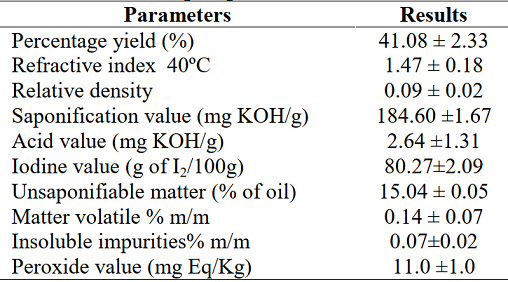Physicochemical Properties of Oil Extracted from Pumpkin (Cucurbita pepo) Seeds
DOI:
https://doi.org/10.62050/ljsir2024.v2n1.276Keywords:
Pumpkin , Physicochemical, seed oil, food industryAbstract
Pumpkin (Cucurbita pepo) is a member of the family Cucurbitaceae and its fruit parts are edible. This study evaluated the physicochemical properties of extracted oil from the seed of pumpkin. The results revealed a percentage yield of 41.08 ± 2.33, refractive index of 1.47 ± 0.18, relative density of 0.09 ± 0.02 g/cm3; saponification value of 184.60 ±1.67 mg/KOH/g, Acid value of 2.64 ±1.31 mgKOH/g, iodine value of 80.27±2.09 g of I2/100 g, and peroxide value of 11.0 ±1.0 mEq/Kg. The result shows that pumpkin seed oil may find application either in food industry as food addictive as it may pose a good quality shelf life or energy generation as biofuels.
Downloads
References
Veronezi CM, Jorge N (2018) Effect of Carica papaya and Cucumis melo seed oils on the soybean oil stability. Food Sci Biotechnol 27:1031. https://doi.org/10.1007/S10068-018-0325-1
Nehdi IA, Sbihi H, Tan CP, Al-Resayes SI (2013) Evaluation and characterisation of Citrullus colocynthis (L.) Schrad seed oil: Comparison with Helianthus annuus (sunflower) seed oil. Food Chem 136:348–353. https://doi.org/10.1016/J.FOODCHEM.2012.09.009
Rosillo-Calle F, Pelkmans L, Walter A (2009) A global overview of vegetable oils, with reference to biodiesel; A Report for the IEA Bioenergy Task 40. IEA Bioenergy
Aremu MO, Ibrahim H, Bamidele TO (2015) Physicochemical Characteristics of the Oils Extracted from Some Nigerian Plant Foods-A Review. 32:
Akintayo ET (2004) Characteristics and composition of Parkia biglobbossa and Jatropha curcas oils and cakes. Bioresour Technol 92:307–310. https://doi.org/10.1016/S0960-8524(03)00197-4
Caili F, Huan S, Quanhong L (2006) A review on pharmacological activities and utilization technologies of pumpkin. Plant Foods for Human Nutrition 61:73–80. https://doi.org/10.1007/S11130-006-0016-6/METRICS
Wenzl T, Prettner E, Schweiger K, Wagner FS (2002) An improved method to discover adulteration of Styrian pumpkin seed oil. J Biochem Biophys Methods 53:193–202. https://doi.org/10.1016/S0165-022X(02)00108-2
von Grebmer K, Bernstein J, Hammond L, Patterson F, Sonntag A, Klaus L, Fahlbusch J, Towey O, Foley C, Gitter S, Ekstrom K, Fritschel H (2018) 2018 Global Hunger Index: Forced Migration and Hunger. Bonn and Dublin
Association of Official Analytical Chemist (AOAC ) (2008) Official Method of Analysis. Washington. DC USA(15th ed)
Hartley CWS (1967) The Oil Palm. Longmans, London
Babagana G, Shittu S. Bamidele, Idris MB (2011) Characterization and Composition of Balanites aegyptiaca seed oil and its potential as biodiesel feed stock in Nigeria. Journal of Tapplied Phytotechnology in environmental sanitation 1:29–35
Basuny MM, Arafat M, Ahmed AA (2012) Vacuum Frying: An Alternative to Obtain High Quality Potato Chips and Fried Oil. Banats J Biotechnol 3:22–30
Siano F, Straccia MC, Paolucci M, Fasulo G, Boscaino F, Volpe MG (2016) Physico-chemical properties and fatty acid composition of pomegranate, cherry and pumpkin seed oils. J Sci Food Agric 96:1730–1735. https://doi.org/10.1002/JSFA.7279
Odunukan RO, Bankole YO, Tanimola OA, Dare BT (2022) Effect of Some Processing Factors Affecting the Yield and Quality of Oil Expression from Pumpkin Seeds. International Journal of Research in Engineering and Science (IJRES) ISSN 10:393–399
Bavec F, Gril S, Grobelnik-Mlakar S, Bavec M (2002) Seedlings of oil pumpkins as an alternative to seed sowing: yield and production costs. Ölkürbis-Jungpflanzen als Alternative zur Aussaat: Ertrag und Produktionskosten 53:39–43
Longe OG, Farinu GO, Fetuga BL (1983) Nutritional Value of the Fluted Pumpkin (Telfaria occidentalis). J Agric Food Chem 31:989–992. https://doi.org/10.1021/JF00119A017/ASSET/JF00119A017.FP.PNG_V03
Akwaowo EU, Ndon BA, Etuk EU (2000) Minerals and antinutrients in fluted pumpkin (Telfairia occidentalis Hook f.). Food Chem 70:235–240. https://doi.org/10.1016/S0308-8146(99)00207-1
Eddy NO, Ukpong JA, Ebenso EE (2011) Lipids Characterization and Industrial Potentials of Pumpkin Seeds (Telfairia occidentalis) and Cashew Nuts (Anacardium occidentale). J Chem 8:1986–1992. https://doi.org/10.1155/2011/974343
Fetuga BL, Babatunde GM, Oyenuga VA (1973) Protein quality of some Nigerian feedstuffs. II. Biological evaluation of protein quality. J Sci Food Agric 24:1515–1523. https://doi.org/10.1002/JSFA.2740241207
El-Adawy TA, Taha Khaled M. (2001) Characteristics and Composition of Watermelon, Pumpkin, and Paprika Seed Oils and Flours. J Agric Food Chem 49:1253–1259
Ardabili AG, Farhoosh R, Haddad Khodaparast MH (2011) Chemical composition and physicochemical properties of pumpkin seeds (Cucurbita pepo Subsp. pepo Var. Styriaka) grown in Iran. J Agr Sci Tech 13:1053–1063
Tsaknis J, Lalas S, Lazos ES (1997) Characterization of crude and purified pumpkin seed oil. Grasas y Aceites 48:267–272. https://doi.org/10.3989/GYA.1997.V48.I5.802
Etuk SE, Okokon KR, Essiet UA (2022) Extraction and Characterization of Trichosanthes cucumerina Seed Oil. J Oleo Sci 71:823–827. https://doi.org/10.5650/JOS.ESS21438
Cheikhyoussef N, Kandawa-Schulz M, Böck R, de Koning C, Cheikhyoussef A, Hussein AA (2017) Characterization of Acanthosicyos horridus and Citrullus lanatus seed oils: two melon seed oils from Namibia used in food and cosmetics applications. 3 Biotech 7:1–9. https://doi.org/10.1007/S13205-017-0922-3/METRICS
Nichols DS, Sanderson K (2003) The Nomenclature, Structure, and Properties of Food Lipids. In: Sikorski ZE, Kolakowska A (eds) Chemical and Functional Properties of Food Lipids. CRC Press, pp 29–59
Younis YMH, Ghirmay S, Al-Shihry SS (2000) African Cucurbita pepo L.: properties of seed and variability in fatty acid composition of seed oil. Phytochemistry 54:71–75. https://doi.org/10.1016/S0031-9422(99)00610-X
Afolabi IS, Ofobrukweta K (2011) Physicochemical and nutritional qualities of Carica papaya seed products. Journal of Medicinal Plants Research 5:3113–3117
Khattab RY, Zeitoun MA (2013) Quality evaluation of flaxseed oil obtained by different extraction techniques. LWT - Food Science and Technology 53:338–345. https://doi.org/10.1016/J.LWT.2013.01.004
Ali SAM, Muddathir AM, Hassan AB (2022) The Physical and Chemical Characteristics of Seeds Oil of Local Sudanese Pumpkin (Cucurbita moschata Duchesne). J Oleo Sci 71:1605–1612. https://doi.org/10.5650/JOS.ESS22007
CODEX ALIMENTARIUS (2023) Standards for named vegetable oils CXS 210-1999

Downloads
Published
Issue
Section
License
Copyright (c) 2024 Lafia Journal of Scientific and Industrial Research

This work is licensed under a Creative Commons Attribution-NonCommercial-ShareAlike 4.0 International License.









